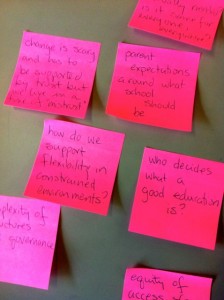Posts Tagged ‘Twitter’
An Announcement in Two Parts – Part 1: Not This Time
Three years ago, I put my name forward as a candidate in the 2011 municipal elections. I ran for the position of Trustee on the West Vancouver Board of Education and was honoured when voters in this community elected me to serve in that capacity.
My foray into electioneering also marked my social media debut outside the comfort zone of Facebook.
I dove into Twitter, a platform with which I’ve become very comfortable and which is now a part of how I absorb, consume, and contribute to media on a daily basis. It has also allowed me to create an invaluable network of connections.
After a long time of saying, “I would like to start a blog,” the election also spurred me to start one which I called The Comfort of Why. The best explanation for this title can be found in the speech I made at the first all-candidates’ meeting in 2011 where I said:
I take great comfort in the question why. As long as I’m asking why, I’m thinking, I’m reflecting, I’m challenging. I am looking for answers rather than assuming I have all the answers. I’m seeking information rather than dictating the way that things ought to be perceived.
To me, this questioning is not about undermining a system and disregarding the work that’s been done. It’s about validating what you believe, being responsive and strategic — making changes when they’re needed, when they’re necessary, and making them at the right time.
My first blog entry was posted on October 19, 2011, and it was comprised almost entirely of questions including this one:
Consider, too, that the BC Ministry of Education is pushing the concept of “personalized learning in the 21st century”. Why? What does it mean?
My position at the time, in regard to this particular question, was as follows:
Well, I want to be at the table to make sure that if there’s an overhaul of the system it’s done well and it’s done right. That it’s implemented in a way which benefits all students.
After three years of being at the table, I still feel this is a valid question and one that is not being addressed at a provincial level.
I still want to have this conversation. In fact, I feel we must have this conversation if we are to continue to offer our children the best opportunities to learn, to grow, and to find their way in the world.
While I recognize the valuable work that our Board has done in the past three years, in collaboration with the District Leadership Team, our education partners, our educators, and all our employees, I will not be seeking reelection in 2014.
Why?
There are a number of factors, but let me focus on three key points.
First, West Vancouver is a community with such depth of talent and with many actively engaged residents who are passionate about education. The deadline for nominations is tomorrow and already seven candidates have filed their papers which means we will have a dynamic and substantive campaign featuring a diverse range of opinions from individuals who all have much to offer.
Second, the most recent job action was very instructive and there are many lessons to be learned in how it played out. One of the most significant learning outcomes for me was to recognize that in order to move the provincial government into action on education, we need much greater direct engagement from the public. That citizens’ voice has to be galvanized if we want to ensure that education is a prominent, if not THE, election issue in 2017.
Finally, education in British Columbia has become such a polarized — and polarizing issue — that what we don’t talk about is education. This discussion — the conversation I’ve always said I wanted to see happen — has been drowned out by criticisms and accusations, by duelling press conferences and media soundbites, by job actions and political posturing.
It’s time that we, as citizens and voters, speak up and get what we want for our children, our society, and our future.
I have some ideas on how we might do just that.
Watch for Part 2.
So You’re a TA, eh?
I’m very pleased to be back at Simon Fraser University (SFU) this term as a Teaching Assistant (TA) with the Department of English. I am leading two tutorial sections for English 104W – “Introduction to Prose Genres: Digital Perspectives on Canada’s Media History and Messaging as a Prose Genre” with Dr. Paul Matthew St. Pierre.
For those of you who follow me on Twitter or on Facebook, you may guess why I’m particularly excited about being a part of this course. Given how much time I currently spend on social media, the course is a way to consider my online practice in a historical and cultural context.
I anticipate that the course content will support what I’m doing, it’ll challenge what I think, and it’ll motivate me to ensure my social media activities are pursued in an even more thoughtful manner. With three lectures done already, I foresee that Dr. St. Pierre may be setting the stage for us to consider our time on social media as “work” within the digital sphere and electronic devices as the tools by which we complete that work.
To think of my time online as work adds a whole new dimension to my role as a digital citizen.
Aside from grounding my social media use in this context, I’m really excited about having the opportunity to work with undergraduate students again.
Why?
It’s not because of the marking, which is likely my least favourite aspect of the job, although assessment is important in the university environment.
It’s not for the office I get to use since it’s remarkable how infrequently students stop by to visit.
It’s not for the authority which the position bestows upon me although it’s wonderful to be able to think about the tutorial sessions as “my classes” and those enrolled as “my students”.
It’s because as I work with the students I feel — I hope — I’m making a contribution to their learning. From exhorting them to look up words in a dictionary, to pushing them to care about writing, to asking them to see beyond the words on the page (or on the screen), I’m trying to show them that they have agency in this world.
I want them to know that their agency will be based on their ability to read, reflect, think, challenge, analyze, and communicate. It doesn’t matter what their career aspirations may be, it doesn’t matter which field of work they intend to pursue, it doesn’t matter what subjects they may wish to study, these are the abilities which will serve them well in any career, in any field, in any subject area.
That is, I want them to value learning, I want them to value thinking, and I want them to know that the ability to fully realize their potential depends on their ability to focus on more than just their grades and to look beyond the message no matter the form.
And in working with them, I recognize that I value my work as a TA because it allows me to do the same with regard to my own agency.
It allows me to recognize the following:
- I’m not so much a person who accepts as I am someone who questions.
- I’m not so much a teacher as I am a student.
- I’m not so much a person who imparts knowledge as I am a learner.
For life.
Crazy Little Thing Called Twitter And The FSAs
At first I lurked.
I’d log on to Twitter.com and scroll through the streams, fascinated.
I started to tweet in support of my campaign during the 2011 civic election and now it’s part of my daily routine.
With Twitter, I keep an eye on my community. I get news from around the world. I read analyses of issues and events from different perspectives. I interact with well-known figures and people in faraway places, opportunities I may never have had otherwise.
Twitter is also ugly at times, “nasty, brutish, and short” in the words of Thomas Hobbes. And while it is liberating to talk to so many so easily, Twitter is also constraining.
Why?
My Twitter account is a mirror of who I am as a whole person, but that whole person includes being a public figure. I have to be aware that although I am speaking personally, some may mistakenly take my views as those of the West Vancouver Board of Education. I have to be aware that while I distinguish between the different hats I wear in life and the various roles I play, others may not.

Which brings me to the Foundation Skills Assessment (FSAs), a test administered to Grade 4 and Grade 7 students throughout British Columbia.
Twitter streams were on fire about the FSAs recently, but I kept mum. I felt that whatever I said in 140 characters could be mischaracterized.
Here’s some of what I wanted to say.
As a parent, I had no objection to my child writing the FSA. As a Trustee, I see value in the data collected because it can be used to align resources with demonstrated need.
Here’s the problem: what we want the FSA to do and what is done with the FSA results have diverged.
FSA data, in addition to use by the provincial government and by school districts, is used by a third-party organization to rank schools.
The Fraser Institute rankings are myopic: they claim to present an overall picture of a school, but the rankings seem to be unduly weighted on one factor, FSA scores.
Rather than the FSA, why not invest in developing literacy screeners for key grades, the results of which would be privately held and exclusively used by the school, the district, and the student’s family? I’m thinking of something like the early literacy screening used for kindergarten students in West Vancouver.
And while I acknowledge that provincial measures are needed for accountability purposes, perhaps a better method of tracking student performance could be determined through a consultative process with key partner groups.
Perhaps by separating the two requirements — diagnostic and reporting — and by creating mechanisms for each, we would be spared the yearly rankling spectacle of school rankings.
At our January public board meeting, Sandra-Lynn Shortall, District Principal – Early Learning, paraphrased a conversation she’d had with Dr. Stuart Shanker. “Early intervention,” she said, “is not the answer to helping students address their needs, rather it’s continuous intervention and connectedness.”
Just as Twitter is not always the best mode of communication, the FSA may not be the best mechanism to match vulnerable or struggling students with the continuing supports they need to succeed in our public education system.
I think we can do better.
Looking Back And Looking Forward
“What is the first part of politics? Education. The second? Education. And the third? Education.”
Jules Michelet, 1798-1874
Le Peuple (1846)
Limbo.
That’s likely the best description for this past week. Not that I haven’t been busy.
My week comprises many elements, and they were all in play this week: being a Mom, working at SFU, participating in my Masters seminar, and doing my volunteer work not to mention meetings, social gatherings, social media monitoring, and chores. Sometimes I’m just boggled at what we cram into a week and, yes, social media monitoring now constitutes a significant portion of my daily life and warrants being designated as a time commitment — sometimes too much so!
It’s been a week since the municipal elections were held and I was elected a Trustee for the West Vancouver Board of Education.
First, there was the muted euphoria of November 19 — final results weren’t posted till 1:00 a.m. the following Sunday morning. Then, the declaration of the official results was made on Wednesday — a low key event attended by precisely three people in addition to the two members of the Legislative Services department: me, my son, and a West Vancouver resident who plays a key part in our community and who was instrumental in one of the municipal councillor campaigns.
I was in limbo because I’d been elected, but didn’t feel like I was doing anything to fulfill the requirement of my new role — aside from trying to catch up on my sleep and wade through the detritus of a five week campaign which still decorates my office like flotsam and jetsam after a storm. It wasn’t until Thursday when I met with Chris Kennedy, the district Superintendent, Carolyn Broady, the other first-time trustee, and had a tour of the district office that the situation began to feel real to me.
And now the wheels are beginning to turn with the promise of much more work in the coming weeks and the growing realization that I have been entrusted by over 3,700 residents of West Vancouver, Bowen Island, Lions Bay, and other GVRD areas to represent their interests in safeguarding, maintaining, and improving the public education system in our communities.
I’ve always voted, in every election at every level, and yet my own experience as a candidate ensures that I will be even more diligent about how I prepare for voting in the future because I understand, with greater insight now, what an act of faith it is to cast your ballot in favour of one candidate or the other.
I am anxious to get started and recognize the steep learning curve ahead of me. It’ll take time to get a good grasp of what’s involved, but I’m not concerned because I enjoy tackling new situations and look forward to the new experiences ahead of me.
However, there is a troublesome issue, a feature of our public education system, which is likely to colour the work I’ll be doing.
One of the new skills I’m developing is the use of Twitter to engage and connect with a wide range of people in all fields of work. My involvement with this social media platform, through the discussions I’ve had with new connections, has really shown me the extent of the rift in the public education sector in our province — it is rife with mistrust and anxiety. There also seems to be an ongoing tendency to demonize the stakeholders on either side of the bargaining table and I can’t help but feel that it’s counterproductive. How will we ever be able to work together effectively when whatever settlement is reached comes with such rancour? And this at a time when the Ministry of Education is consulting on what is meant to be a new direction for education to ensure the best for British Columbia’s students in the 21st century?
I guess I’m about to find out how that will affect the work I’m able to do in an effort to fulfill the expectations of all those who’ve expressed their support for me with their vote. More importantly, those who are looking for me to deliver on my commitment to help ensure the strength of a system which has a direct impact on the life experience of their children.
I will do my best.
Helping Secondary Students Contend With Post-Graduation Options
There’s an item on my to-do list that’s lingered for months: not a now thing. It’s an odd name for an action item, but consider it a secret family code.
I’ve been intrigued by the notion of jumping on board the Twitter express and of establishing a personal website as my on-line home. The website, as originally envisioned, would be a private one accessible to extended family members and close friends only. It would also be a platform for sharing my son’s artwork with those we know well. The concept intrigued him and in the evenings he’d ask, “Mama, can we do the website now?” Given that the question was often posed with five minutes to go until bedtime, my answer was, “No, it’s not a now thing.” Thus, the cryptic notation on my to-do list.
 With my decision to run as a Trustee candidate for the West Vancouver Board of Education, the not a now thing has become a done thing albeit in a different format and for a different reason. It’s a step I had wanted to take, was hesitant about taking, and then was propelled into taking as circumstances unfolded. I had to make new decisions and had to face the requirement for immediate action. A looming election date is a strong motivator!
With my decision to run as a Trustee candidate for the West Vancouver Board of Education, the not a now thing has become a done thing albeit in a different format and for a different reason. It’s a step I had wanted to take, was hesitant about taking, and then was propelled into taking as circumstances unfolded. I had to make new decisions and had to face the requirement for immediate action. A looming election date is a strong motivator!
This personal progression has made me reflect on a question that’s already popped up a number of times during the campaign. This question is often framed in the context of whether the emphasis on educating our students for a post secondary career in academics neglects opportunities for graduates who may be inclined to other avenues of study.
What a challenging question! We live in a time of straitened resources and there’s very little success to be found when organizations attempt to be “all things to all people”. There are other factors to consider, too. For example, family expectations and pressures which are private and individual to each situation. For those of us who’ve accumulated life and work experience, we also know that our paths and our destinations often change in unexpected ways.
With these and other factors in mind, what role might the school district play in accommodating different learning intentions?
It would seem to me that the answer is not to force students into career decisions too soon, but rather to offer broad horizons for them to consider and to equip them with the tools needed to consider and weigh their options. Providing the resources to investigate alternatives and enabling them to become better decision makers with regard to their own learning and course of studies. Work experience programs, summer internships, guest presentations by working professionals, in residence programs, assemblies focused on career planning, increased counseling support — I’m sure much is already being done and I think there are a myriad of other options which might also be explored.
It would be great to have the opportunity to work with our community of educators on a well-integrated range of programs and initiatives to let West Vancouver students know that while their career choices may not be a now thing, they have been well-prepared to find their own way among the many, many options available to them.

